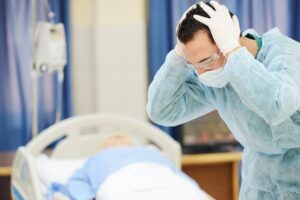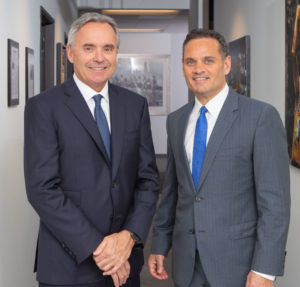What Is Needed to Prove Wrongful Death?
What Is Needed to Prove Wrongful Death?
If you are seeking justice and compensation for the loss of a loved one resulting from another party’s negligence or wrongful actions, you’re probably wondering what you need to prove wrongful death.
Proving wrongful death involves presenting compelling evidence that establishes the negligence of the responsible party, and gathering the right evidence can strengthen your claim and increase your chances of a successful outcome.
If you are in California and seeking to prove wrongful death, it is essential to understand the specific laws and requirements in the state. A skilled and compassionate personal injury attorney can guide you through the legal process and advocate for your rights.
By understanding the necessary elements and seeking the assistance of a skilled wrongful death attorney, you can increase your chances of achieving justice and compensation for your loved one’s untimely death.
Schedule a Free Initial Consultation
Establishing Negligence in a Wrongful Death Case
When it comes to proving a wrongful death, one of the key factors is establishing negligence on the part of the responsible party. Negligence refers to the failure to exercise reasonable care, resulting in harm or injury to another person. In the case of wrongful death, it means demonstrating that the actions or inactions of the responsible party led to the untimely death of an individual.
Different types of negligence can lead to a wrongful death claim.
These include:
- Gross negligence: This involves the extreme disregard for the safety and well-being of others, resulting in a fatal outcome. It goes beyond ordinary negligence and often involves intentional wrongdoing or reckless behavior.
- Medical negligence: When medical professionals, such as doctors, nurses, or hospitals, fail to provide the appropriate level of care, resulting in death, it may constitute medical negligence. This can include misdiagnosis, surgical errors, medication mistakes, or improper treatment.
- Product liability: In cases where a defective product causes a fatal accident or injury, the manufacturer or distributor may be held accountable for the wrongful death. This could include faulty car parts, dangerous pharmaceuticals, or defective household appliances.
- Premises liability: Property owners have a responsibility to maintain safe conditions on their premises. If someone dies due to a hazardous condition or inadequate safety measures, the property owner may be considered negligent.
You need to prove negligence in a wrongful death case to hold the responsible party accountable. However, establishing negligence and proving wrongful death requires an experienced wrongful death attorney who can navigate these challenges and advocate for your rights.
Gathering Evidence for a Wrongful Death Claim

In a wrongful death case, you need a lawyer to gather strong evidence to prove your claim and seek justice for your loved one. The evidence you collect can play a pivotal role in establishing liability and determining the amount of compensation you deserve in a wrongful death settlement.
Types of Evidence
- Medical Records: Detailed medical records can provide valuable information about the extent of the injuries or illness leading to the wrongful death.
- Photos and Videos: Visual evidence, such as photographs or videos of the accident scene, injuries, or dangerous conditions, can help recreate the events and support your claim.
- Witness Statements: Statements from witnesses who saw the incident or have knowledge of the circumstances surrounding the wrongful death can strengthen your case.
- Expert Testimony: Expert witnesses can provide specialized knowledge and analysis to support your claim, such as accident reconstruction experts or medical professionals.
- Police Reports: Official reports filed by law enforcement agencies can provide crucial details about the incident, including statements from involved parties and any criminal charges or citations.
- Financial Records: Documented financial losses, such as medical bills, funeral expenses, or lost wages, can demonstrate the economic impact of the wrongful death.
Importance of Collecting and Preserving Evidence
Collecting and preserving evidence is vital to the success of your wrongful death claim.
By following these steps, you can help ensure the evidence remains credible and admissible in court:
- Act quickly: Time is of the essence when it comes to gathering evidence. Memories can fade, physical evidence can be lost or destroyed, and witnesses may become difficult to locate.
- Document everything: Take thorough notes, photographs, and videos of the incident, injuries, and damages. Keep records of all medical treatments, conversations with authorities, and any other relevant details.
- Obtain official documentation: Request copies of police reports, accident reports, medical records, and any other official documents related to the incident.
- Preserve physical evidence: If there is physical evidence, such as defective products or damaged equipment, preserve it and do not tamper with it in any way.
The quality and strength of the evidence you present can significantly impact the outcome of your wrongful death claim. An experienced wrongful death attorney can help ensure you gather the necessary evidence and navigate the legal process effectively.
They may also consult with experts such as accident re-constructionists, forensic specialists, and private investigators to collect and evaluate pertinent evidence to support your case.
What Types of Wrongful Death Damages Can I Receive?

In a wrongful death case, you can seek various forms of compensation for your losses. When someone’s carelessness, recklessness, or unlawfulness kills a close family member, you may qualify to pursue a variety of damages, including:
Financial Losses
Financial losses are one of the primary categories of damages in a wrongful death case. This includes any expenses incurred as a result of the death, such as medical bills, funeral and burial costs, and loss of future income or financial support.
Calculating the economic impact of the loss is a critical step in determining the appropriate compensation, and an attorney can evaluate your case and assess the full compensation you need.
Emotional Distress
The emotional impact of losing a loved one in a wrongful death case can be devastating. You may seek compensation for the emotional distress you experienced.
This may include feelings of grief, sorrow, pain, and suffering. You may rely on expert testimony and evidence to demonstrate the emotional toll the untimely death caused you and your family.
Loss of Companionship
Wrongful death not only causes emotional distress but also deprives family members of the love, companionship, and guidance that the deceased would have provided. Loss of companionship damages aim to compensate for the loss of the relationship and support that family members would have enjoyed if their loved one had not been wrongfully killed.
The loss of a loved one in a wrongful death case goes beyond financial loss. It leaves a void in the lives of the surviving family members that can never be filled. Although no amount of money can bring back your beloved family member, the compensation you receive can help ease your financial burden.
An experienced wrongful death attorney can help ensure you properly identify and quantify your damages so that you can pursue fair compensation to cover all your losses.
Keep in Mind the Statute of Limitations for Wrongful Death Actions

The law gives you a limited time to file a wrongful death lawsuit. The statute of limitations for wrongful death cases in California, for instance, is generally two years from the date of the death. However, certain exceptions and circumstances can affect the time limits, so consult an experienced wrongful death attorney as soon as possible.
Who Can Bring a Wrongful Death Claim in California?
Under California law, the following individuals may qualify to bring a wrongful death claim or lawsuit against an at-fault party:
- Surviving spouses or domestic partners
- Children of the deceased
- Parents of the decease
- Grandchildren
- Putative spouses and children
- Stepchildren
If the deceased had no surviving spouse, children, or grandchildren, other individuals who depended on the deceased for financial support may bring a wrongful death action.
In cases involving multiple claimants, a personal representative of the decedent’s estate may bring a single action on behalf of all beneficiaries.
Contact a Wrongful Death Attorney Near You Right Away

Greg Bentley & Keith More Wrongful Death Attorneys
If you believe that you have a wrongful death claim in California, it is essential to take prompt action and consult an attorney who handles wrongful death claims. They can guide you through the legal intricacies, help you understand the specific laws that apply to your case, and advocate for your rights in court.
With a lawyer’s experience, skills, and resources, you can obtain fair and rightful compensation for the financial, emotional, and personal losses you have suffered.
The personal injury attorneys at Bentley & More LLP are here for you and your family during this difficult time. Contact us today for a free consultation to learn of your rights and options.
We are fully committed to helping you gather all you need to prove a wrongful death in California and advocate for you to increase your chances of getting the maximum compensation you deserve.


